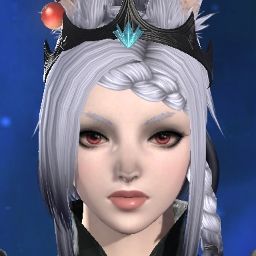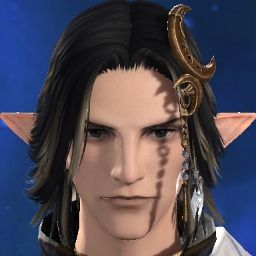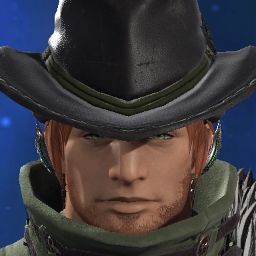I chose Emet-Selch.
Ancients are kind of based, would gladly sacrifice all of the scions for them.
-
08-03-2022 01:31 AM #721(7)
-
08-03-2022 01:40 AM #722Player

- Join Date
- Nov 2017
- Posts
- 14,150
- Character
- Aurelie Moonsong
- World
- Bismarck
- Main Class
- Red Mage Lv 100
I think a key thing here is the writer's outlook, because I'm not sure who it is originating from specifically, but the idea of a civilisation becoming too comfortable and grinding to a halt and decline comes up right back in the first lorebook describing the rise and decline of the Allagan empire.
So if this concept is something a core writer holds as a concept to be a natural course of civilisation, then they may not feel a need to foreshadow it heavily when they use it again.
Maybe it's Ishikawa, maybe it's someone else, maybe it's a pervasive idea among the dev/writing team. But the earlier mention of it makes me think it's something they saw as already inherently possible, not a scenario they invented for that one setting alone.(7)
-
08-03-2022 03:11 AM #723Player

- Join Date
- Jul 2015
- Location
- Meracydia
- Posts
- 3,883
- Character
- Lythia Norvaine
- World
- Gilgamesh
- Main Class
- Viper Lv 100
I find it really odd that anyone would only just now notice the commentary on utopia as it relates to the Amaurotians. It was the central theme of the Eden raid series, so this has been an active theme well before Endwalker.
If you'll recall, Mitron wanted to create a timeless utopia free from suffering in which he could be with Loghrif for all eternity, even if it meant destroying her memories against her will as well as the First in the process. Yoshi-p and the writing team were just being polite in their response. The Convocation already has a proven track record of choosing the Ra-la ending.
In fact, in the lead in to the E11S fight, Mitron reaches into Ryne's memories to try and turn her own hopes and fears against her, giving rise to the the Fatebreaker (which is essentially a combination of Ran'jit and Thancred). He does so with the expectation that it would break you, much like it did the Amaurotians during their Final Days. He is naturally enraged at being proven wrong:
Ascian Prime (Mitron + Loghrif): 'That fragmented souls should triumph over their fears while we succumbed to ours, thereby setting our star on a course to ruin... That inferior beings such as you should succeed while we failed! It defies all logic!'
And if you looked up the etymology of the term 'utopia', you'd know that the word itself is a contradiction in terms, intended as a critique of the concept (literal: 'no place'). Individuality and conflict go hand in hand. I just find it entertaining that some people are using the word unironically in support of the 'superiority' of the Amaurotians when when the literal expression is intended as a condemnation.(9)
-
08-03-2022 03:14 AM #724Player

- Join Date
- Feb 2019
- Location
- Ul’dah
- Posts
- 822
- Character
- Eara Grace
- World
- Faerie
- Main Class
- Paladin Lv 100
Here we go again. Just claim the people who like it have their brains turned off and that's that. And folks wonder why this discussion is a dumpster fire.
Between the attempts to portray those who defend Endwalker as low brow media consumers and the desperate attempts to paint over the Ancients flaws and portray the Sundering as wholly unjustified (as if that wouldn't make Hydaelyn a straight up villain ), its little wonder these discussions become so heated. Its clear folks have diametrically opposed viewpoints on the way the story should go.
), its little wonder these discussions become so heated. Its clear folks have diametrically opposed viewpoints on the way the story should go.
Ishikawa wrote the Crystal Tower raids as well so I agree.(11)Last edited by EaraGrace; 08-03-2022 at 03:38 AM.
-
08-03-2022 03:37 AM
Player
-
08-03-2022 04:06 AM #725
I'll probably regret asking, but I feel compelled to anyway. Are you trolling?
The point people are making is that her actions are already morally ambiguous. Asking the narrative to acknowledge that--as it already has in the questline under discussion--does not fundamentally change anything about Hydaelyn's motivations or what you like about her.
Unless the only thing you like about her is that the Scions are united in how much they like her.(9)
-
08-03-2022 06:10 AM #726
Let me preface this by saying I realize I'm in the unfortunate position of being told, "You could've just not gotten anything." Which is true. However, it doesn't change the fact that this is specifically for the WoL tucked away in a side quest. (Friends had to rush me through the Omega raid series so I could even do it. Were it not for the fact that I'm involved on the forums I never would've even known it existed. I think the fact that this 'concession' is so easily missed cannot be overstated.) It changes nothing for our permanent, immortal friends, the Scions. It changes nothing for the MSQ. Ideally, I would've liked the protagonist cast at large to reflect upon it, particularly because Venat does embody ideologies they have opposed in the past, as recently as ShB no less.
Well, I feel like I have made my position clear about this ad nauseum. (Note: This isn't directed at you as much as the readers at large.) I never expected Venat to be the villain. (I feel like I need to hold a press conference. :P) What I did expect was the nuance of ShB to carry over to EW, for Venat to be the opposite side of the coin of Emet, a truly morally grey character who was still in ideological opposition to us and needed to be stopped. Instead, ironically, we almost got that except with the framing that "it's okay when she does it". All I wanted was consistency. It's not okay when she does it. Stop lauding this woman and stop 'othering' the Ancients.There are definitely ways it could have been better, but I really do wonder what some people's expectations are here, you know? From the beginning, it's been obvious that the main scenario team isn't going to go back and literally rewrite a finished game, or turn around and directly contradict it by making Venat an explicit villain in the post-expac content.
I saved this quote from you, because it echoed how I felt about it:For all their flaws, this is the same writing team that created Shadowbringers, the success of which was the reason I was so let down by Endwalker to begin with. I do feel like I owe them a little good faith in response to a step in the right direction. It does kinda feel like an increasing amount of people in these threads are completely despondent about the future of the story and only really here for the catharsis of complaining about EW, and though I obviously do get it, it doesn't really feel productive for me personally at this point.
The Omega quest doesn't change this. Everything outside of it still frames Venat in exactly the same way as before and just because the writer(s) may have conceded the players who had issues with it have a point, it's not sufficient evidence yet to me that we're 'ethically on the same page' now, which is especially concerning going into a "conflict of values" arc.
I've spent months debating on whether or not I should quit. The main reason I haven't yet is because I do actually like the rest of the game. I only ever post regarding story and characters because I have no major gripes about anything else. Matter of fact, I really like future direction of the game. I can't with this story though. Some days I'm ready to pull the trigger, others I say, "Let's see what 6.2 brings (*copium*)."
Regardless, I didn't ask for or expect 6.0 to be rewritten, what's done is done. However, any reference to those events in the future ideally would be handled with the nuance they should've been handled with in EW.(7)
-
08-03-2022 07:06 AM #727Player

- Join Date
- Oct 2019
- Location
- Gridania
- Posts
- 1,948
- Character
- Khit Amariyo
- World
- Leviathan
- Main Class
- Sage Lv 100
I admit, I never read it as that the Sundering was in and of itself a legitimate choice -- or even a particularly good one -- but rather a move largely of desperation (at least in the original timeline). My understanding is basically:
- World is ending. Half of the population of Eitherys is sacrificed to create Zodiark.
- Zodiark saves Eitherys by holding the Final Days at bay, but the planet is barren.
- Half the remaining population of Eitherys is sacrificed to give Zodiark enough juice to make the world verdant and filled with life once more.
- As part of this, new 'lesser' races come into being. (E.g., the races we now see: Hyur, miqo'te, etc.)
- The Convocation -- and presumably others -- go "Cool! Sentient living things! That's a bunch of juicy aether; we can sacrifice all of them to bring back the folks we killed off to create and empower Zodiark. Everybody wins!"
- Some Ancients point out that no, not everybody wins, because they are kind of opposed to sacrificing other races. Races who may lack the means to fight back against the power of the Ancients -- much less Zodiark -- but demonstrably would prefer to, y'know, not be wiped out as a mass sacrifice. Those serving Zodiark do not care and are prepared to do so regardless, because Tempering.
- Hydaelyn suplexes Zodiark in a last-ditch effort to try to stop him and his followers from killing off all the new 'lesser' non-Ancient races. The resulting bodyslam Sunders everything: Zodiark, Hydaelyn herself, and the entirety of Eitherys. That said, the fragmentary bits of Zodiark continue to hold their seal against the Final Days.
- The 'lesser' races, being aetherically 'smaller', slip through the cracks as it were; some survive the Sundering, albeit are scattered across the shards. The Ancients, being far more aether-dense, also get Sundered along with the world. (Though the Sundered pieces of their souls begin to reincarnate in the surviving "lesser" races across the various shards.)
- The three surviving members of the Convocation hatch a plan to smash all the shards back together and resume where they left off.
- Lots of stuff happens for tens of thousands of years (if not longer).
- Eventually, a reincarnated and semi-congealed fragment of Venat's protege and successor travels back in time to before all of this, telling Venat what has happened/will happen and basically locking the events into place as a loop; now Hydaelyn seemingly does this because it's "what has to happen".
I admit that last one is the part that rings "off" to me; yes, you could assume that changing the past might obliterate the future and thus prevent the WoL from going back and giving the information necessary to change the approach to the Final Days, causing paradox. Except that we know from Shadowbringers that things and memories from one timeline can survive a shift to another; the Eighth Umbral Calamity has not happened and -- presumably -- now never will, but the timeline in the wake of that Calamity sure had an impact on the First and the Source via Shadowbringers.
(Though admittedly, changing the past so far back, and causing the world to never be Sundered -- and thus many people we care about to potentially never exist in the first place -- definitely brings its own set of thorny moral questions. So perhaps Venat/Hydaelyn felt obligated to see the timeline through on the original path specifically to preserve those lives...?)
That said, I certainly don't disagree that they probably could've found a better solution in theory, but I suspect it would've required the Convocation not to get themselves Tempered by trying to make a god in the first place; once that had happened, they probably weren't inclined to listen to reason any longer, if said 'reason' went against what Zodiark perceived as 'the will of the people'.(1)I aim to make my posts engaging and entertaining, even when you might not agree with me. And failing that, I'll just be very, VERY wordy. Originally Posted by Packetdancer
Originally Posted by Packetdancer
-
08-03-2022 07:25 AM #728Player

- Join Date
- Jul 2015
- Location
- Amaurot
- Posts
- 4,449
- Character
- Tristain Archambeau
- World
- Cerberus
- Main Class
- Black Mage Lv 90
Had they presented tempering as an obstacle to that in any sense, I'd perhaps agree, but I don't think the story as written supports that at this point. She does not allude to it when discussing their motives, when addressing her followers in the Anamnesis scene, and her decision to not disclose the true origin of the crisis is made before the MC even leaves Elpis, both to prevent panic amongst the populace and, in the Convocation's case, to avoid alienating Hermes. Those are her reasons for not doing so. Zodiark's tempering (which comes down purely to his sheer power rather than flawed rites etc.) is such that Emet-Selch can even abandon his original cause/plan should he will it and, as noted, her reasons for not levelling with her people are separate to it. As such, my inclination is to discount it.
I would consult the 6.1 LL Q&A on the topic of the sundered races (the XIV Reddit discord contains more complete transcripts in its LL translation area) - they are the result of the newfound sundered state of the fragmented ancients resulting in environmental adaptations to their surroundings. The Q&A also elaborates upon her motives, which had little to do with the sacrifices in and of themselves, on which I made a previous post here which contains links further back to the source material on it. Instead, her rationale is framed in terms of her belief that they'd have no way to manipulate dynamis and would end up like the third Dead End, because she felt they were incapable of changing. The former is her stated concern in response to Y'shtola, the latter is at least implicit in a lot of the dialogue concerning articulation of her motives in-game and outright stated in the Q&A, which also touches on the question of the time loop. Worth a read! You may also find this interesting on the topic of timelines.
I echo the sentiment on what you draw out as the issue. Trying to tighten up the reasoning for it here wouldn't have made a difference me with all else remaining much the same. Especially since quite often such avenues proposed involve introducing dystopian elements to Amaurot (i.e. trying to turn it into a scenario where these "hubristic" immortals had it coming), which was not a route I was keen to see them take as - to be blunt - I simply don't care for that theme. I am not its target market, and I preferred SHB's theme of the ancients' story being the tragic end of a truly great and noble people, without an implication of it being self-caused; with this resulting in an irreconcilable conflict between the interests of those remnants of their own who fought on their behalf both out of duty to them and nostalgia for the world/people they lost on the one hand, and the sundered on the other, and a compromise in defeat through honouring their memory. In a sense, although I don't agree with the themes they ran with to warrant their end, I'm glad they were as feebly implemented as they were, as arguably it left them some wriggle room to attribute it all to her beliefs in the Q&A and open up the debate about the character's views on it all via the Omega quest.
With the Rejoinings (leaving aside that these are part and parcel of any attempt to commit to the current timeline and become predictable through sparing a certain someone), they're at best presented as an acceptable/justifiable cost to the Ascians within the context of their aims (still taking a significant mental toll on someone like Emet), and it is in that sense you have some of the protagonists saying they'd do the same in those circumstances; it does not stop the Scions from fiercely opposing them, though, out of their desire to protect their own world. As Vyrerus pointed out, particularly if we accept the spin that is often put on the UT scene, here we are asked to believe that even the last remnants of the ancients, having suffered as much as they did over the past 12k years due to the Sundering, are just fine with the conclusion and could not conceive of a better way (???), whilst very little is said by the protagonists about the very substantial costs and actual necessity of it all, and options to even question this are non-existent prior to the Omega quest. Everyone's happy! Cloaking it in a time loop does not wither away this problem, and in fact given the answers provided at the Q&A, worsens it in some respects.
I think if they wanted to avoid a controversy on this level, they could've had it be accidental in nature and Venat trying to salvage the remains of that, and in that there would be room for reconciliation in dealing with the true cause of the original crisis. Alternatively, embrace the controversy, as you say, and run with something closer to the encounter with Yunalesca, or at the very least which embeds the treatment Omega brought into the base MSQ.
Anyway, at this point my plan is to merely check in to see what direction they take it in and whether the Omega quest represents a change in direction or was a one-off.(9)Last edited by Lauront; 08-03-2022 at 08:49 AM.
-
08-03-2022 08:49 AM #729
As with some lines pertaining to the Scions in Endwalker, that quote kind of bugged me because it's framing the sundered as being "better" then the Ancients when the individuals being tested were really not representative of mankind as a whole.
Both sundered and unsundered alike had droves of people who succumbed to the effects of dynamis, yet both also had those who managed to persevere and survive.(9)
-
08-03-2022 10:40 AM #730Player

- Join Date
- Jul 2015
- Location
- Meracydia
- Posts
- 3,883
- Character
- Lythia Norvaine
- World
- Gilgamesh
- Main Class
- Viper Lv 100
Mitron's quote isn't even from Endwalker. It's from the Eden raid series in Shadowbringers, which seems to have faded from memory around here. It's a commentary specifically about the Amaurotian Final Days.
Conflict arises from individuality and diversity. We all have different wants and needs. But diversity also confers a survival advantage. Omega's analysis of the Final Days was that there was no single unique trait that defined all the survivors. But because we don't all think the same way, our individual experiences with it were all different.
That's the central paradox with utopias. It's not that they're decadent and hedonistic; you can have that without an utopia. It's that the elimination of conflict requires you to stifle individuality. That's the common thread that you see in several of the fallen societies we encounter, be it the Ea, the Omicrons, and even the Amaurotians. A single stumbling block affected them universally.
Whether you agree with these themes is a personal choice, of course, but this entire concept has already been explored at length in Shadowbringers, right down to Mitron trying to create a timeless paradise free from suffering at the expense of the world's destruction.(5)


 Reply With Quote
Reply With Quote














